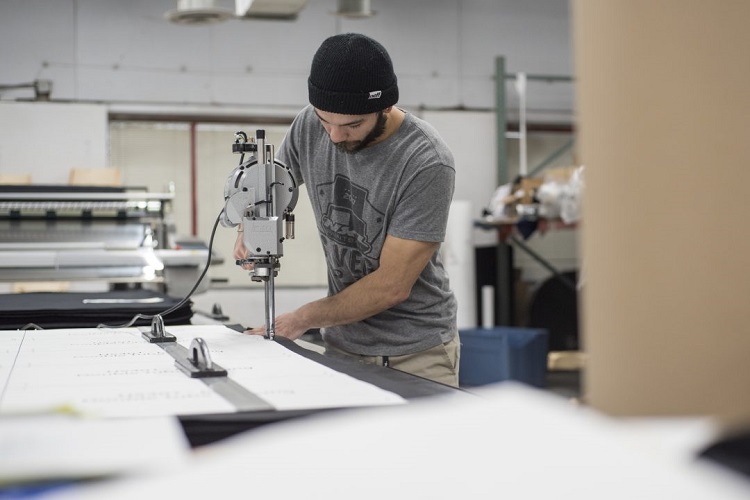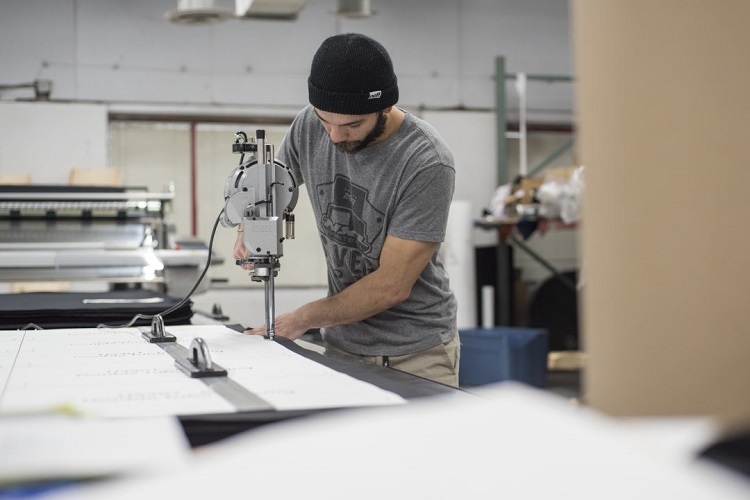This Company is Making Ski Masks from Recycled Plastic
Best for Colorado: Phunkshun Wear manufactures its masks right here in Colorado
ColoradoBiz Staff //October 8, 2019//


This Company is Making Ski Masks from Recycled Plastic
Best for Colorado: Phunkshun Wear manufactures its masks right here in Colorado
ColoradoBiz Staff //October 8, 2019//

In Colorado, you can find unique ski gear and clothes pretty much anywhere you look. But have you stopped to think about where it’s being manufactured? Phunkshun Wear is looking to change that. The Denver-based company is manufacturing its facemasks out of recycled water bottles.
The company was started by a group of snowboard instructors, who spent over 300 days a year in the mountains from Colorado to New Zealand, bearing all types of weather conditions. They recognized a gap in the market for a functional, yet stylish product that could handle winter’s variable weather. Lanny Goldwasser and his business partner at the time created a product that used the business’s operations as an opportunity to generate long-term value.
Designed primarily for the ski industry, the company’s impact goes farther. All materials are sourced and processed by partners domestically, while Phunkshun Wear employees manufacture the masks right here in Colorado.
We spoke to Jason Badgley, chief executive officer of Phunksun Wear, to learn more about the company and its desired impact.
ColoradoBiz: What differentiates your company in the market?
Jason Badgley: Very early on, we identified that U.S. manufacturing was the right way to go. We also wanted to utilize recycled material and integrate sustainability as a core fundamental value of our company. The real trick is to make something that is quality and worthwhile that provides value for the customer. That is our priority focus and what we are exceeding at here – making a U.S. made, sustainably manufactured consumer product that people find value and longevity through.
You have to know it is more expensive, it’s more difficult and it’s more time consuming to manufacture. For us, it isn’t even a question that it is the right thing to do.
CB: How were you able to make this come to life?
JB: We had to ask, ‘How can we alleviate problems, but also make it benefit our competitive business nature and provide more value and a better and more sustainable product?’ Interestingly enough, having the fabric domestically manufactured alleviates a lot of concerns. People importing fabric and products run into problems at customs and ports with shipping timelines and things like that.
At the end of the day, we are a business like any other and we have to look at the bottom line and what is the best interest of the company. If you really take a hard look at it and you look at the best interest of the company, the customer and the employees ̶ they often align in a lot of ways.
CB: Can you tell me more about your supply chain and manufacturing process?
JB: When it comes to plastic bottle recycling, we source the yarn that is made from recycled plastic bottles and milled into fabric from a company called UNIFI. They pioneered the recycling of plastic bottles into yarn and the brand of yarn is called Repreve. They have manufacturing mills around the world. We specifically utilize yarn that they make from domestically sourced plastic water bottles in North Carolina. After that, the yarn is milled into fabric domestically and then that gets sent to us in Colorado where we cut, decorate and sew it.
There is no system in the U.S. that is good or widely available for recycling polyester scraps. The base element is petroleum. The process to recycle and remanufacture is quite expensive and it is not available everywhere. We are very lucky that our yarn supplier allows us to send our 100% polyester fabric scraps back to them for recycling. While we are not able to recycle all our fabric scraps, a significant portion is sent back to be turned back into fabric.
CB: How do you communicate your values to partners in this process?
JB: The key is picking partners with similar values. When we find suppliers that share our values and that inherently believe in them as well, it creates a better relationship. We are supporting them with our dollars and if they are able to create jobs with these dollars, the whole process works well.
Our product packaging could be sourced overseas for a very small cost; however, we source it here in Denver from a local manufacturer. Not only are we supporting local jobs in our community, but it is a very short transit time and it allows us to be more reactive and less dependent on extended shipping timelines. There are a lot of business reasons why it does make sense as opposed to just the per unit costs.
CB: What are some of the challenges you face in production, especially with regards to responsible practices / materials? How do you overcome these challenges?
JB: Selecting recycled polyester fabric as our primary and main raw material does limit us slightly because we have not introduced natural fibers. We use Repreve because they introduce engagements in the recycling process so that they can actually track, test and verify that our products are made with recycled plastic bottles.
As far as production, skilled labor is the hardest challenge we face. Sewing is not sexy. We pay well but the Starbucks next door will have more turn over than we even have applicants.
CB: What is most rewarding/challenging about this aspect of your organization’s work? What areas are your most concentrated on right now and why?
JB: What we do is expensive. While it is very rewarding and everyone loves it, the challenging part is that customers will not pay a dime more. People want to pay the same price for our product as a product made form a standard factory overseas in a highly polluted manufacturing process. It is rewarding that people love it, but it is very challenging that with their own money, they value it the exact same.
The point is not to make disposable products, the point is to make a quality product that lasts and provides value.
CB: What is your proudest achievement in the work the company is leading?
JB: From a data point of view, we keep 1-million plastic bottles out of landfills, mountains, oceans and rivers. They are recycled into something else that allows people to enjoy the outdoors.
From a quantifiable point of view, we are providing jobs for skilled people. They deserve to be paid and have good benefits. They have talent and skill. There are a lot of people who have never been to university or college, and they will never go. So to support the local community where our employees and friends live is something to be proud of.
CB: What do you recommend for other companies interested in exploring responsible production and business operations but aren’t sure where to start?
JB: Don’t listen to people who tell say you can’t do it. Everyone who we talked to when we were starting up or giving us advice (who had 40 plus years of experience in textiles) said everything that we are doing cannot be done and will never work. They were wrong.
The earlier you start implementing sustainability changes and practices, the easier it will be. It is much easier to make it a priority at the beginning even if it is small, than to change everything after you have established your processes and your workflow. Earlier is better, but do what you can, where you can, when you can. We can all do better. There is a right time for everything and if it is not the right time to make a change, don’t compromise your company, your product or your employees because you want to make a change that is not doable at that point.
Best for Colorado is a program of the Alliance Center. It allows Colorado companies to measure and improve their social and environmental impact, regardless of where they are on their corporate social responsibility journey. Best for Colorado offers programming and tools for all Colorado companies, including B Corps, to improve their practices and connect participating companies with local resources, education and support.

























